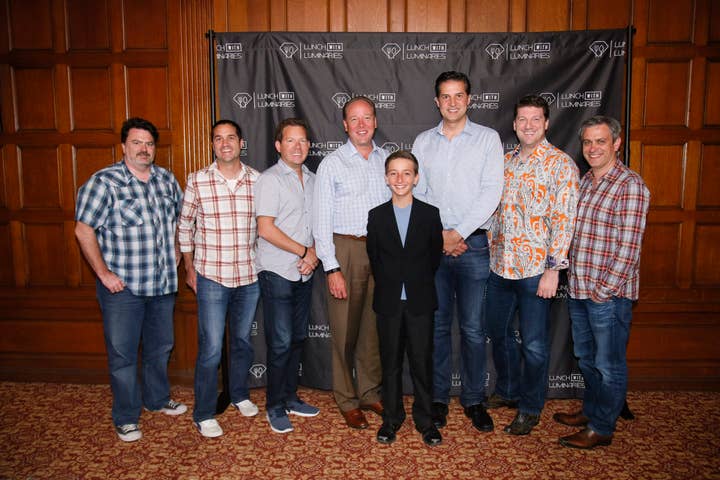Big names talk mobile tactics, Nintendo's dilemma
Pitchford, Bleszinski, Iribe and more discuss the industry at David Perry's Lunch With Luminaries
Much of E3's most interesting moments are livestreamed these days, but there are still smaller events that don't get as much ink but should carry just as much interest. One such event is David Perry's Lunch with Luminaries, a group chat where the founder of Gaikai and Earthworm Jim studio Shiny gathers big names for an informal and (ideally) unfiltered discussion about the state of games. This year's assemblage of luminaries included Gearbox Software president Randy Pitchford, Boss Key Productions co-founder Cliff Bleszinski, ngmoco and N3twork founder Neil Young, Double Fine Productions founder Tim Schafer, Entertainment Software Association president Michael Gallagher, Amazon Games VP Mike Frazzini, and Oculus CEO Brendan Iribe
While the event boasted some of the bigger names in today's industry, Perry started things off by introducing someone who could be joining them in the future. The first few topics of the event were determined by 13-year-old Thomas Hughes, a game developer headed into the eighth grade, but with three published iOS games to his credit already. One of Hughes' first inquiries was about whether the educational systems of today are preparing kids properly for a career in the games industry, which quickly turned into a discussion about the value of a college degree for game developers. Fully half the panel (Pitchford, Bleszinski, Iribe, and Perry) managed their success without a college degree. In some cases, that was because schools simply didn't have courses to teach game developers back then, a situation Gallagher was quick to point out was no longer the case.
"If you're really going to get into design, I think knowing what's out there in the world of literature, science, and philosophy makes you much more diverse in being able to pull interesting ideas that haven't been pulled before."
Tim Schafer
Pitchford said all the information students can get in school can also be obtained elsewhere now. Everything is immediately available, so the secret isn't access to it. The secret is in finding out what information you want, and then being motivated enough to pursue it and apply it.
Bleszinski said that if he had it all to do over again, he would have gone to school as a safety net until he was sure enough in his skills that he could drop out and launch a successful career regardless. Beyond the subjects one can learn about in a scholastic setting, Bleszinski also said it can be key to learning the essential skill of how to work with other people.
Schafer said he felt obligated to stand up for degrees, saying one of the most valuable things he took away from college was being exposed to things he never thought he'd be interested in.
"I had to take an anthropology course, and I didn't think I was interested in it. It ended up being the course that taught me about folklore, and all sorts of myths and legends and things I ended up borrowing on so much," Schafer said. "That's where I got the idea for Grim Fandango, and everything came from this one course. I didn't go on to study anthropology beyond that, but it was just a touch that made me realize... I was happy to be mildly forced into all these directions. There's just a ton of amazing things in the world. The world's really broad; it's not just games programming. If you're really going to get into design, I think knowing what's out there in the world of literature, science, and philosophy makes you much more diverse in being able to pull interesting ideas that haven't been pulled before."

Iribe added that fields like electrical engineering are best learned through universities, and particularly specialized areas like computer vision require a degree, if not a PhD. While he acknowledged degrees aren't for everybody, Iribe said he was a big believer in them nonetheless.
The developers also discussed the importance of visual fidelity in games. Iribe jumped on the topic first, saying that great graphics are crucial for the future of virtual reality games, but less so for something like a mobile game, where there's not much screen real estate for hyper-detailed visuals and the emphasis is more on how players control and interact with the games.
"We are at a really rich graphic level," Iribe said. "VR wouldn't exist without really great graphics systems. Part of why it exists today and it didn't exist in the past is that we have these incredibly powerful GPUs that enable us to render at 90 frames per second these believable worlds. I think if you look at the future of where it's going to go, you're going to get very, very photo-real worlds. We're going to cross the uncanny valley and you're going to start manipulating the world we live in with game graphics."
"I think if you look at the future of where it's going to go, you're going to get very, very photo-real worlds. We're going to cross the uncanny valley and you're going to start manipulating the world we live in with game graphics."
Brendan Iribe
Pitchford balked slightly, suggesting it depends on what the creative objective of the content is. If the game is supposed to immerse you in a world you think is real, maybe graphics are paramount; but if the objective is to test cognitive abilities or challenge reaction times, the visuals become much less important.
"Graphics follows the design," said the Gearbox boss; "it doesn't lead it."
That led Perry to bring up Threes, which got the room buzzing with praise. Frazzini referenced an article where the developers said they still had to figure out a good way to make money off it, saying it was sad a game so popular could fall short financially. Young offered a possible explanation as to why.
"If you look at the top grossing charts on mobile, it's almost inversely correlated with graphic quality," Young said, adding, "I think it's about user context. When you're using a mobile phone, it's always with you and the great games that are going to be the most successful are ones that boot quickly, that you can immediately get into and have an enjoyable experience with, and ones that are intelligently monetized can be really big businesses. Context trumps everything."
Pitchford responded, "I haven't looked at the top-grossing charts on mobile lately, but the last time I did I remember there being a lot of really casual engagement games; Clash of Clans was up there. Those games seem to be more about monetizing on habits. The relationship those games have with their audiences is less like what a typical entertainer has--hey I'm going to show you something and I hope you feel you got more value out of it--and more like kind of the relationship that a tobacco company has with its customers."
The room responded to the incendiary remark with a bit of laughter, with Pitchford suggesting the highest grossing games "are basically about getting you addicted and monetizing small segment of people vulnerable to that kind of attack."
"I've always said when we monetize how we operate our studio and the game, we want to be more Disney World than Las Vegas."
Cliff Bleszinski
Bleszinski weighed in from the perspective of a developer working on his own free-to-play game.
"It's a weird metaphor for me, but I've always said when we monetize how we operate our studio and the game, we want to be more Disney World than Las Vegas," Bleszinski said. "I've spent a lot of money at Disney and it costs a lot of money to get in. But when I leave I'll be happily exhausted. When I leave Las Vegas, I feel bad."
While much of the discussion covered larger industry trends, one question put to the participants specifically dealt with Nintendo. Considering the company has been putting out games with enviable Metacritic averages, why is it that Nintendo seems to have struggled so much in the market of late.
Pitchford said it doesn't matter how good their games are if people don't know they exist, and likened it to a common situation in movies. He said he's noticed a trend whenever he goes to Rotten Tomatoes to look for the best films now playing.
"It tends to be that some of the highest rated things on Rotten Tomatoes are films I've never even heard of," Pitchford said. "They're indie things that are marketed not to me. Nintendo's gotten really good at talking to Nintendo customers. But I think that Nintendo could at least lead more if they figured out how to talk to new people that they're not already talking to. And that's a very difficult problem."
Frazzini agreed, and brought up another Disney analogy. He took his kids to Disneyland and asked them if they wanted to see Mickey Mouse, only to find out they legitimately didn't know the character. Of course, they were still very familiar with Anna and Elsa, stars of the recent phenomenon Frozen. Pitchford picked up on that point, saying Nintendo faces a common problem in the industry in being a slave to its past success.
"We're always trying to invent the new thing, and it's scary because no one knows what the new thing is, so you have to build the gravity up," Pitchford said. "Meanwhile, your existing customers are screaming, 'Give me more of the old thing!' But we know the biggest brands of the future don't even exist today. And the brands that are biggest today will fail, will go down. So from my point of view, the only option is to create new stuff. I'm making a new game and nobody knows what it is. A lot of people know and like the last big thing we did and ask why aren't you doing more of that? It's funny because I had the exact same thing happen the last time. When we were trying to figure out Borderlands and telling people why that was going to be cool, everyone was like, 'Why don't you make more Brothers in Arms?'"
"When we were trying to figure out Borderlands and telling people why that was going to be cool, everyone was like, 'Why don't you make more Brothers in Arms?'"
Randy Pitchford
Iribe had to leave the lunch a little early, coincidentally just a few minutes prior to the topic of virtual reality inevitably coming up. When it was broached, Iribe might not have liked the question, specifically, "How do we know VR isn't this year's second screen experience?"
Frazzini was first to answer, saying, "I resolve myself to thinking if you put this much money and talent against something, you can make anything better. Frozen peas would be better. It's just impossible not to have something great come out of it. There are so many resources going into it."
Schafer followed with his own convincing reasoning, saying, "I think it's easy to be sceptical of any new technology, and I'm always the first, but I think the difference is that there's a vision for it even in literature. I credit a lot of this to Snow Crash or Ready Player One. They're not necessarily positive visions of virtual reality, but people have created, like, 'This is what it could be like.' I don't think anyone ever wrote a book about how great it's going to be when we have a second screen."

